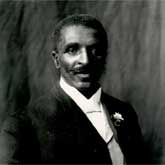Inventor: George Washington Carver
 George Washington Carver, born a slave in 1864 (approximately), contributed significantly to agricultural research. Although he was orphaned as an infant, endured hardship in pursuit of his education, and encountered racial prejudice at every juncture, Carver has become revered for his focus on the poorest southern farmers and his creative chemistry which served to revitalize the economy of the war torn South. He encouraged Alabama farmers to practice plant rotation and soil building techniques using nitrogen producing legumes like sweet potatoes and peanuts. To encourage this practice he developed over 400 products from the sweet potato and peanut. These and other products from pecans, cotton, and waste products virtually changed the economy of the South. Throughout his life he revered nature and felt his discoveries were from divine revelation and so belonged to everyone.
George Washington Carver, born a slave in 1864 (approximately), contributed significantly to agricultural research. Although he was orphaned as an infant, endured hardship in pursuit of his education, and encountered racial prejudice at every juncture, Carver has become revered for his focus on the poorest southern farmers and his creative chemistry which served to revitalize the economy of the war torn South. He encouraged Alabama farmers to practice plant rotation and soil building techniques using nitrogen producing legumes like sweet potatoes and peanuts. To encourage this practice he developed over 400 products from the sweet potato and peanut. These and other products from pecans, cotton, and waste products virtually changed the economy of the South. Throughout his life he revered nature and felt his discoveries were from divine revelation and so belonged to everyone.
In 1894, Carver received a Bachelor of Agriculture from Iowa State Agricultural College and became a member of the faculty of Iowa State College. In 1896, he received a Master of Agriculture from Iowa State College. In 1896, Carver was recruited by Booker T. Washington to become the Director of Agriculture of Tuskegee Institute in Alabama and the Tuskegee Agricultural Experiment Station. In 1906, he designed the 'Jessup Wagon' to bring information and demonstrations to farmers in the Alabama country side. This later became the basis of the USDA Extension Service. In 1921, Carver appeared at the US House of Representatives Committee of Ways and Means about the peanut tariff. The United Peanut Association elected him to go and speak on their behalf. This was the beginning of his life as a folk hero. In 1935, he was appointed Collaborator, Mycology and Plant Disease Survey, Bureau of Plant Industry, USDA.
During his first 20 years at Tuskegee, Dr. Carver produced agricultural products which helped create a demand for crops other than cotton in the south. From peanuts, over 300 products including: milk, cheese, cream, coffee, plastics, paper, wood stains, flour, soap, linoleum, cooking oils, cosmetics, and medicinal massaging oils. From sweet potatoes over 118 products including: starch, tapioca, mock coconuts, molasses, breakfast foods, feed for livestock, dyes, flour, vinegar, ink, and synthetic rubber. From soybeans: flours, coffee, cheese, sauce, bisque for ice cream, oil, chick food, soup mixtures, bran, and stock food. From waste and native materials: rugs, tablerunners, table mats, scarfs, fuel briquettes, floor mats, synthetic marble, wallboard, wood veneers from yucca and Florida palm, vegetable dyes, etc. From cotton: paving blocks, cordage, paper, fiber for rope, and many other products.
Fact Credit
USDA Department of Agriculture


